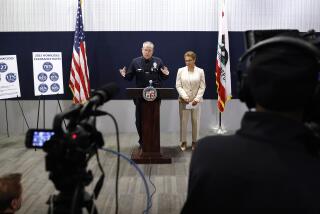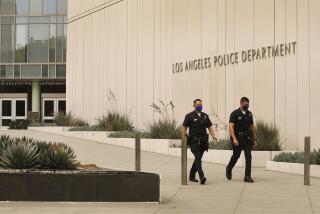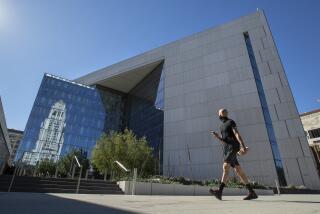Editorial: Clear, thoughtful rules are needed for recordings by LAPD
The Los Angeles police sergeant who caused a controversy when he detained “Django Unchained” actress Daniele Watts in response to a 911 call last month has now publicly defended his decision to turn over an audio recording he made of the incident to the celebrity news site TMZ, which then posted it.
Speaking at a meeting of the Police Commission on Tuesday, Sgt. Jim Parker said he released the recording to show that his stop of Watts, who is black, and her boyfriend, who is white, was not racially motivated. The couple has argued otherwise. The Police Department’s internal investigation of the incident is ongoing.
In general, it’s a smart idea for police officers to carry audio or video recorders and to turn them on during traffic stops and other interactions. By creating an objective record of encounters between police and the public, such recordings can help discourage — or document — police misconduct and, conversely, can serve to clear officers if they are falsely accused of wrongdoing. For two decades, some Los Angeles police officers have chosen to use audio recorders in the field. Some L.A. Sheriff’s deputies carry their own audio equipment as well.
There are already rules in place for LAPD officers who use audio recorders. They must have permission from the department, must maintain their own equipment, and must keep the recorder going for the entire interaction. They must note the recording in their daily activities report, and make it available to their supervisors when asked. Parker acknowledged to the Police Commission that turning the audio over to TMZ was against department rules.
In general, though, it is not the best policy to allow officers to decide on an individual, ad hoc basis whether or not to record stops. The LAPD needs a policy that ensures that all officers have the technology — audio or video — to keep a record of interactions.
To its credit, the LAPD has been working for several years to put video cameras in all patrol cars, though the program has been rolled out slowly. And the department is currently testing on-body “cop cams” — video cameras that all officers would wear. A survey on the department’s website asks Angelenos for their opinions on officers wearing video cameras.
The LAPD needs better rules to govern the use of recording devices, and especially to balance the promise of accountability they offer with the potential loss of privacy. Will people be told they’re being recorded? How long will the recordings be kept? Will they be available to prosecutors and defense attorneys, or to the public through a Public Records Act request? Will they be used by police inside people’s houses?
Cop cams should benefit not only the police but also those they stop. But clear, thoughtful rules need to be developed to ensure that they are not misused.
Follow the Opinion section on Twitter @latimesopinion
More to Read
A cure for the common opinion
Get thought-provoking perspectives with our weekly newsletter.
You may occasionally receive promotional content from the Los Angeles Times.






